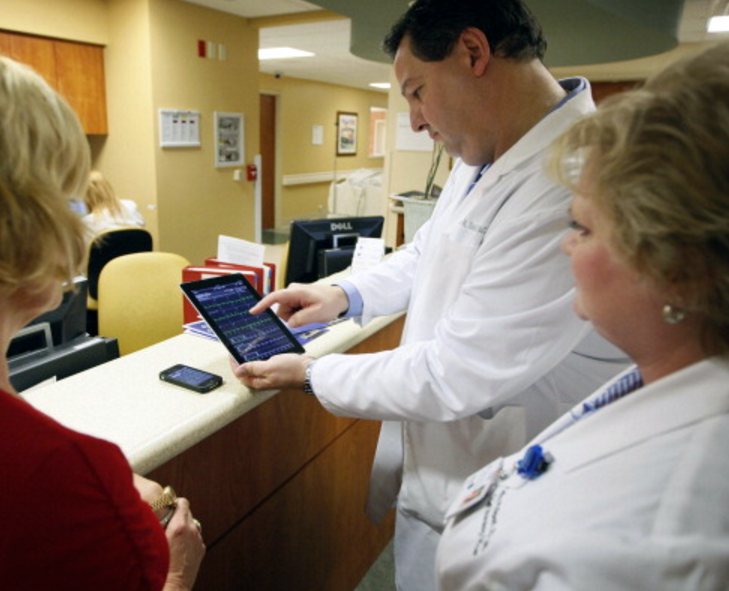
Technology is transforming all areas of society and health is no exception. Mobile apps, big data and wearables are slowly changing the relationship between doctor and patient and now everyone appears to understand that reform of the health system will be through digital transformation. But as with all revolutions, this transformation raises doubts and challenges, some of which were raised during Mobile Week Barcelona, in a debate on "Quality of life and digital revolution in health," which was held at the Vall d'Hebron Hospital.
"Technology is vital for the sustainability of any system in today's society, and that includes the health system," says Joana Sánchez-Morillo, commercial director of AAPP and Sanitat Catalunya. The growth in life expectancy has meant that many illnesses have become chronic, and "the system has always been focused on acute illnesses. Patients are not getting the response they hope for," she says. This situation also affects the economic sustainability of a health system that finds it increasingly hard to sustain costs. "We are going through a change of paradigm in health in which the challenges are to improve health, improve treatment and reduce costs," says Marta Sánchez Beret, from the Clúster Management of Salut Mental de Catalunya. "ICT is key, without it it will be impossible to continue moving ahead," adds Sánchez-Morillo.
"The degree of adopting new technology in health is increasing exponentially like in all spheres of society," says Montserrat Vendrell, partner at Alta Life Sciences, who thinks that the most important thing to ask right now is to what degree apps, wearables and other technological tools are being used in clinical practice and by patients.
Apps to improve medical attention
The application of digital technology in the health sector brings a lot of opportunities for improving the service. Doctor Ramos Quiroga, president of the Innovation Committee at Vall d'Hebron, thinks that technology allows for "putting the patient at the centre of our activities," and he gives two examples. With the app Scan Kids, children lose their fear of scanners and therefore fewer children needing to be anaesthetised when taking these tests. On the other hand, telemedicine has helped in bringing the expertise and know-how of burn specialists at Vall d'Hebron to other parts of the country, "and to offer cures closer to the patients."
They are successful examples of this digital revolution we are facing, even though many challenges remain. Bárbara Vallespín, head of the d-LAB programme in the Mobile World Capital Barcelona, points to the first challenge of integrating technology as part of the digital ecosystem of health professionals, and that requires "a standardisation of this technology to make it easier and transparent."
Another challenge is linked to training. "Clinics increasingly demand attention for patients on alternative channels to provide more coverage," points out Sánchez-Morillo, but to do this health professionals need to be trained and be given the capacity to use this technology.

Diàleg "Quality of life and digital revolution in health". Mobile Week Barcelona
260,000 mobile apps
In third place, work needs to be done to show the efficiency and efficacy of this technology. Today there are 260,000 mobile apps in the area of health and every day new and interesting projects emerge. "There needs to be clinical evidence of the results, so health professionals can prescribe them knowing that they work," says Vallespín. "Technology has to provide a response to the needs and not to create the needs, because sometimes technology is created without a clear picture," points out Francesc Garcia Cuyàs, director of the Tic Salut Foundation. According to Garcia Cuyàs, the European Community is working on creating a model of accreditation for health apps, something that Tic Salut is also working on.
Montserrat Vendrell goes on to explain, from her experience with investment, that today there are still a lot of entrepreneurs who present technology proposals "but who have not asked themselves what impact it will have in the clinical sphere, or why a doctor should use it, or who will pay for it."
The business model of Digital Health is another question that the sector raises. "Technology has to be sustainable, focused on results and not so much about payment for the service," insists Vallespín.
Trends in investment in Digital Health
Nevertheless, the application of technology to health is a sphere with many business opportunities, something the specialists are aware of. The main trends in investment in this sector are in robotic surgery and genomics, as well as for insurers. Vallespín thinks that the digital transformation of health will be led by players it is hard to imagine now, such as private health insurers. "Today they are a bit like the banks, they have to reinvent themselves and become agents of health, and they will play a more active role in prevention, as they will try to make sure the public stays more healthy."
However, where there is real investment interest is in Big Data. "Investors look for companies and proposals to create safe spaces for the exchange or integration of data," says Vendell. Thus, Vallespín points out that in the future "we will be able to decide whether to give out our data so that it helps to speed up research, in the same way that we now donate our blood or organs. We will decide who, why and with what aim we give out our data."